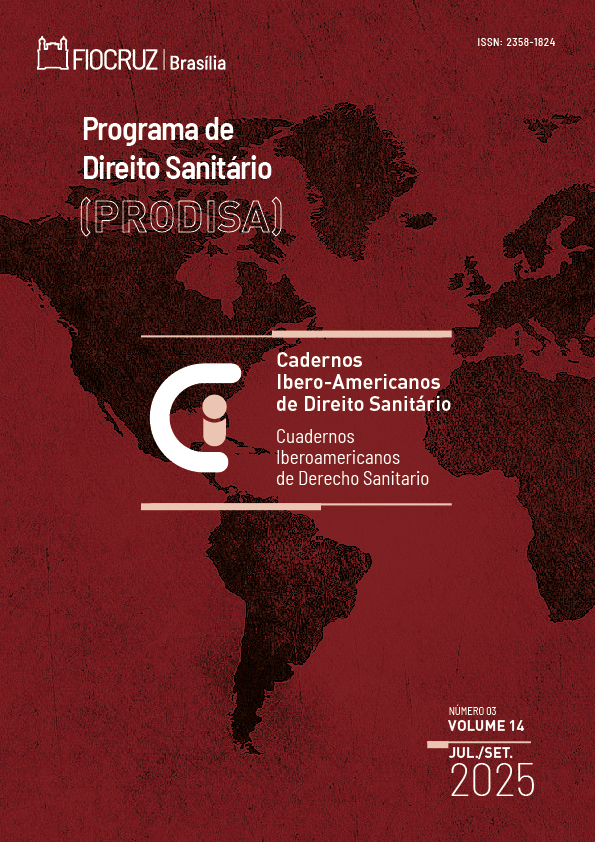Abstract
Objective: to understand how artificial intelligence can help in the early diagnosis and monitoring of Alzheimer's disease, considering the ethical challenges related to data privacy in the health area. Methodology: integrative literature review. A structured search was carried out in the electronic data sources PubMed, LILACS, The Lancet, MDPI and SciELO and original or non-original scientific articles were selected, without language restriction and with a five-year time limitation. Results: it was observed that the interface between artificial intelligence and health emerges as a promising field, especially for the management of complex diseases such as Alzheimer's. Artificial intelligence offers the possibility of more accurate diagnoses, personalized treatments and a better quality of life for patients. However, the potential of artificial intelligence is accompanied by complex ethical and legal dilemmas, especially regarding the collection, storage, privacy, informed consent, algorithmic discrimination, liability and use of health data. Conclusion: the implementation of artificial intelligence systems in healthcare requires a balance between the benefits of potential early diagnosis and the need for greater protection of patient privacy. An additional challenge to be considered is the need for impartiality and transparency in the algorithms used. There is a need to propose guidelines for the development of artificial intelligence systems that are safe, fair and transparent, that respect patients' rights and promote equity in access to healthcare.
Submitted: 03/04/25| Revision: 08/11/25| Approved: 08/12/25
References
Janus C, Westaway D. Transgenic mouse models of Alzheimer's disease. Physiol Behav [Internet]. Ago. 2001 [citado em 12 abr. 2025]; 73(5):873-86. DOI: 10.1016/s0031-9384(01)00524-8
Wang L-xue, Wang Y-zhe, Han C-guang, Zhao L, He L, Li J. Revolutionizing early Alzheimer's disease and mild cognitive impairment diagnosis: a deep learning MRI meta-analysis. Arq. Neuro-Psiquiatr. [Internet]. 2024 [citado em 12 abr. 2025], 82(8):1-10. Disponível em: https://doi.org/10.1055/s-0044-1788657
Lobo LC. Inteligência Artificial e Medicina. Rev. Bras. Educ. Med. [Internet]. Abr. 2017 [citado em 29 jan. 2025]; 41(2):185-93. Disponível em: https://doi.org/10.1890/1981-52712015v41n2esp
Silva R. Inteligência Artificial. Enciclopédia da Conscienciologia. DSpace [Internet]. 2013 [citado em 26 jan. 2025] [Enciclopédia]. Disponível em: http://reposicons.org/jspui/handle/123456789/3737
Da Silva GG, Silva HP, Rodrigues MLA. Desafios do uso da inteligência artificial nos diagnósticos de saúde: uma revisão integrativa. Cadernos Ibero-Americanos de Direito Sanitário [Internet]. 2024 [citado em 29 jan. 2025];13(2):11-18. Disponível em: https://doi.org/10.17566/ciads.v13i2.1241
London AJ, Karlawish, J, Largent EA, Hey SP, McCarthy EP. Algorithmic identification of persons with dementia for research recruitment: ethical considerations. Informatics for Health and Social Care [Internet]. 2024 [citado em 22 set. 2024]; 49(1):28-41. Disponível em: https://doi.org/10.1080/17538157.2023.2299881
Livingston G, Huntley J, Sommerlad A, Ames D, Ballard C, Banerjee S, et al. Dementia prevention, intervention, and care: 2020 report of the Lancet Commission. Lancet [Internet] 2020 [citado em 13 abr. 2025]; 396(10248):413-446. Disponível em: https://www.thelancet.com/article/S0140-6736(20)30367-6/fulltext
Dadalto L, Guirro U. Bioética e cuidados paliativos. Indaiatuba: Editora Foco; 2023.
Mayur K, Nitu W, Rupali P, Suhas B, Rohit K, Manish G, et al. AI-driven innovations in Alzheimer's disease: Integrating early diagnosis, personalized treatment, and prognostic modelling. Ageing Research Reviews [Internet]. 2024 [citado em 21 set. 2024]; 110: 1568-1637. Disponível em: https://doi.org/10.1016/j.arr.2024.102497
Souza MT, Silva MD, Carvalho R. Revisão integrativa: o que é e como fazer? Einstein. [Internet] 2010 [citado em 01 fev. 2025]; 8(1):102-6. Disponível em: https://www.scielo.br/j/eins/a/ZQTBkVJZqcWrTT34cXLjtBx/?format=pdf&lang=pt
Nunes HC, Guimarães RMC, Dadalto L. Desafios bioéticos do uso da inteligência artificial em hospitais. Rev. Bioét. 2022 [citado em 22 set. 2024]; 30(1):82-93. Disponível em: https://doi.org/10.1590/1983-80422022301509PT
Silva-Spínola A, Baldeiras I, Arrais JP, Santana I. The Road to Personalized Medicine in Alzheimer’s Disease: The Use of Artificial Intelligence. Biomedicines [Internet] 2022 [citado em 22 set. 2024]; 10(2):2-19. Disponível em: https://doi.org/10.3390/biomedicines10020315
Loveys K, Prina M, Axford C, Domènec ÒR, Weng W, Broadbent E, et al. Artificial intelligence for older people receiving long-term care: a systematic review of acceptability and effectiveness studies. The Lancet Healthy Longevity [Internet] 2022 [citado em 22 set. 2024]; 3(4):286-297. Disponível em: https://pubmed.ncbi.nlm.nih.gov/35515814/
Brasil. Lei nº 13.709, de 14 de agosto de 2018. Lei Geral de Proteção de Dados Pessoais. Diário Oficial da União: Seção 1, Brasília, 8 jul. 2019 [citado em 17 mai. 2025]. Disponível: https://www.planalto.gov.br/ccivil_03/_ato2015-2018/2018/lei/l13709.htm

This work is licensed under a Creative Commons Attribution 4.0 International License.
Copyright (c) 2025 Caroline Parra Marques, Larissa Vitória Costa Carrazzoni de Souza, Marcos Vinícius Coltri, Ademir Franco (Autor)

